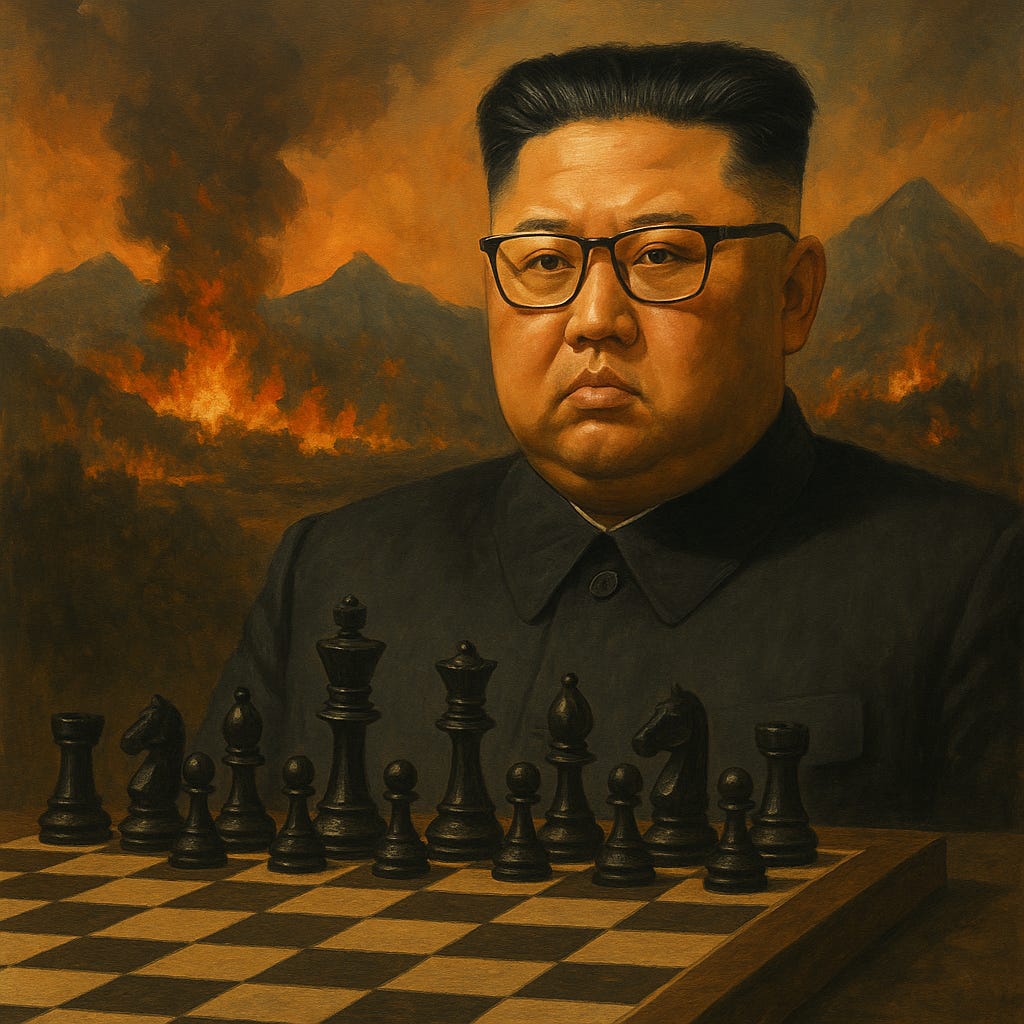“He who fights with monsters should be careful lest he thereby become a monster.”
— Friedrich Nietzsche
I. The Age of Iron Silence:
It is easy to mock what you do not understand.
And the world mocked North Korea.
They laughed at its parades, its famine, its rigid smiles and sepia-tinted footage of missile tests. The West treated the nation as a grotesque museum — frozen in time, absurd in aesthetic, laughable in ambition.
But Pyongyang never cared for applause. It did not desire to be understood — only to endure.
And so, while empires danced in circles — funding coups, igniting wars, rewriting maps, and collapsing in on themselves — North Korea waited.
II. The Geopolitical War of Attrition:
After the Cold War, the narrative was set: the "rogue state" must either reform or perish. But North Korea, unlike Gorbachev’s USSR or Deng’s China, refused both. It neither collapsed nor complied. It didn’t liberalize its markets nor offer up its soul for IMF loans.
Instead, it fortified — spiritually and militarily.
And the longer it held out, the more it exposed a hidden truth:
The world doesn’t punish evil — it punishes weakness.
Iraq gave up its WMDs. Libya opened its ports. Ukraine relinquished its nukes.
All three were torn apart.
North Korea learned from each — and took the path no one else dared: isolation backed by firepower. It turned itself into a radioactive black box. You couldn’t invade it without risking nuclear fallout. You couldn’t "liberate" it without ending the Korean Peninsula.
What appeared as madness was actually cold logic:
Don’t become a client state. Become a crisis no one can solve.
III. A World Shifting — And the Map Tilts:
Now, as the tide turns and the Global South rises, North Korea is no longer an oddity.
It is an oracle of a coming era — one defined not by liberal democracy, but by multipolar friction, economic nationalism, and asymmetric warfare.
As BRICS expands, sanctions weaken, and U.S. hegemony fractures under its own contradictions, North Korea emerges as a symbol — not of prosperity, but of postcolonial stubbornness. It says, simply: “We’re still here.”
And its silence now speaks louder than a thousand peace conferences.
IV. Kim Jong-un: The Villain Who Understood the Game:
Kim inherited a poisoned legacy and turned it into a throne of shadows. He is not a visionary. He is not a genius. He is a survivor — perhaps the last of his kind.
In a world obsessed with soft power, he chose the aesthetic of menace.
While liberal democracies collapsed into identity crises, Pyongyang projected clarity — brutal, archaic, and unyielding.
Kim knew that the West respects only what it fears. And what it cannot control.
This is why, when other leaders were assassinated, overthrown, humiliated, or indicted, he remained untouched — a shadow prince in a kingdom of fog.
V. The Coming Role of the Hermit Kingdom:
So where does this lead?
North Korea becomes a minor but significant gear in the new Eurasian machine, supplying Russia with artillery and gaining oil, food, and political cover in return.
Its mineral wealth and labor force, long untapped, may find their way into BRICS corridors.
Its experience — of surviving sanctions, evading coups, and mastering narrative warfare — becomes a model of resistance for struggling postcolonial regimes.
More importantly, Pyongyang becomes proof that you don’t have to kneel to survive.
And this terrifies the West.
Because it means the narrative is collapsing. That democracy doesn’t always win. That isolation isn’t death. That sometimes, stubbornness — when backed by steel — is enough to outlast an empire.
VI. The Final Irony:
Perhaps the greatest irony is this,
While the West built its fantasy of freedom atop drones and data, it was the most censored, closed-off nation on Earth that had the clearest view of reality.
And while liberal democracies decay under the weight of their contradictions — from within, through decadence; and from without, through overstretch — the one state that refused to change is the one that might still be standing at the end of the storm.
Not triumphant.
Not righteous.
Just… still there.
“The world told us to open up, to smile, to reform.
We chose to watch instead.
And now, the world burns — while we play the next move on the chessboard”.




An interesting insights and perspective on a country the collective wests see as pariah. While the collective wests extremism terror wars are happening around the world, Pyongyang is certainly not sitting back with their bag of popcorns but would be busy reinforcing their defence capabilities against the marauding western extremists unprovoked attack.
Appreciate your insights that are relevant and enlightening, particularly for the global South